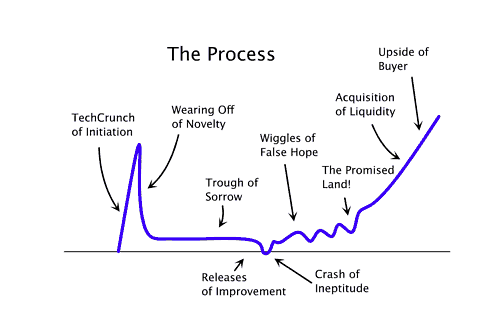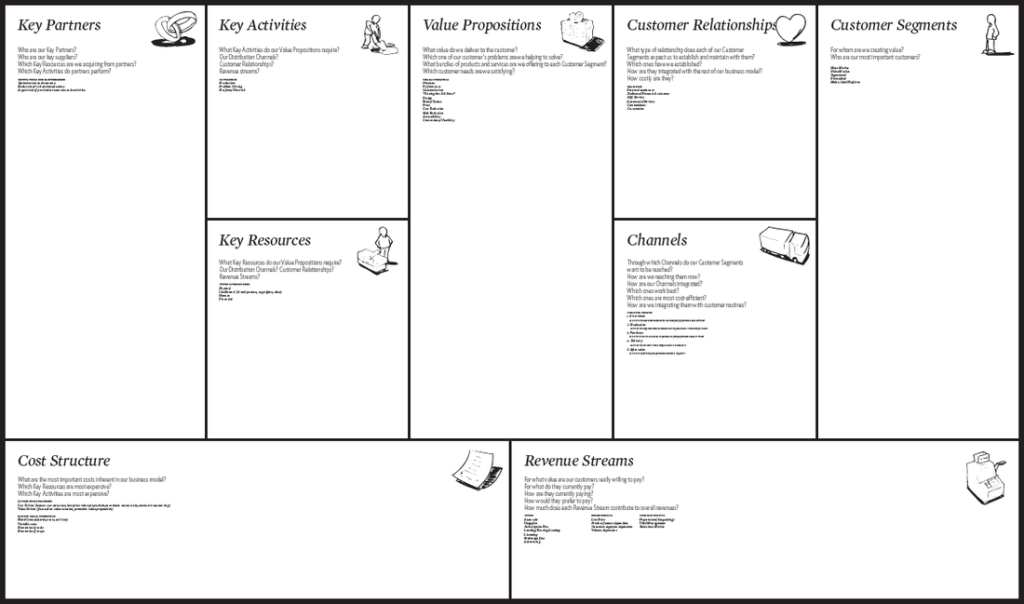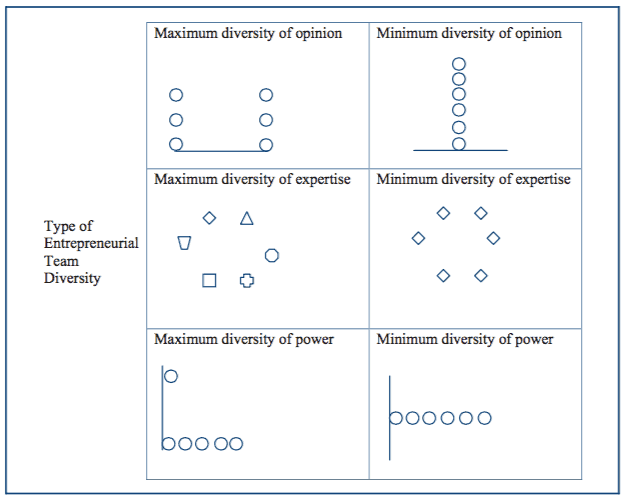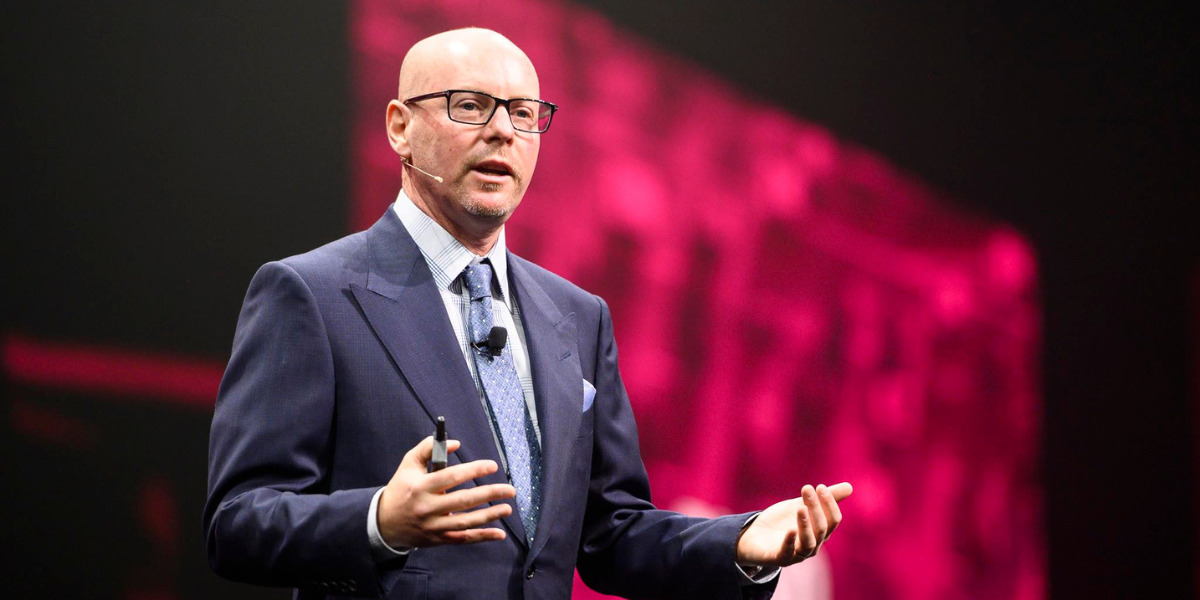There’s an art to creating the perfect founding team.
A startup can have all the potential in the world, but nothing can derail things faster than its “people problems.” In a study about startup performance, venture capitalists attribute 65% of company failures to problems within the startup’s management team.
Make no mistake, more than anything else, startups live and die by the people that bring them to life.
Ideas can pivot and evolve as they grow, funding can always be found somewhere else, the market will always change with a never-ending supply of competitors. But the team that brings it all together forms the company’s DNA.
So, let’s get down to it, let’s break down what makes the perfect founding team!
Table of Contents
What a Founding Team Should Look Like
What Kind of Founding Team do you Need?
Where to Build Your Team of Founders
Why You Need a Team
While there’s nothing wrong with being a solopreneur, you have to realize that you’re playing with a handicap from the get-go.
According to the Startup Genome Report, solo founders, on average, take 3.6 times longer to scale when compared to startup teams of two or more. It also found that teams were more likely to attract investors and experience success in comparison to solo founders.
Why is that? Well for one thing, to investors, it’s a vote of no confidence.
It doesn’t matter how hard-working or talented you may be, or how brilliant your idea is. To investors, it looks like no one else but you believes in your idea.
But most importantly, you won’t have a partner to help pick you back up when things go wrong. In the startup world, the highs are high, and the lows are low.
When you inevitably hit the trough of sorrow, it’ll hurt, and picking yourself back up is a hell of a task. Having a friend to talk to, who understands exactly what you’re going through, to be there when you need it makes all the difference in the world.

While undoubtedly the most famous, Steve Jobs was not the only founder of Apple. It took the collective efforts of Jobs, Steve Wozniak, and Ron Wayne to get Apple off the ground.
Bill Gates had Paul Allen, Richard Branson had Nik Powell, and while Arianna Huffington may be the editor-in-chief and face of The Huffington Post, it was a team of four founders that brought it to life.
It’s not impossible to go solo but a startup is hard enough, so why go it alone?
Don’t Skip: How to Start a Startup (Advice from 16+ Successful Founders)
The Magic Number
Here’s an interesting bit of information. After analyzing a handful of successful startups, apparently, the perfect number of cofounders is 2.09. Others will argue that three is the perfect number. But it’s generally agreed upon that four is pushing it, and any more than that is just inviting chaos.
The reason is that a founding team should be as lean as possible. Two is good because it allows you to distribute the necessary workload and trust is high. Three allows for more diversity of skill and specialized roles but introduces more opportunities for unnecessary drama. Four means you can, theoretically, get even more work done, but trust is generally lower and politics come into play.
Any more than four means you have a committee, and you’re more likely to be focusing on power plays and egos rather than working together to build a great product.
But whether or not you choose to have a founding team of two, four, or eight, what really matters is the diversity of roles, experience, and responsibilities. Because if your cofounder is just a carbon-copy of yourself, then you’ve got a big storm coming.
What a Founding Team Should Look Like
The last thing you want your founding team to be is a collection of skills and abilities that don’t complement each other. At the end of the day, the size of your team is nowhere near as important as the qualities that each individual member brings.
The perfect founding team will have these three roles: the visionary, the hustler, and the hacker. Together these three make up the golden triangle, the foundation of every successful founding team.
Regardless of a team’s size, you need to fulfill these three roles if you want to succeed. Any other roles, while helpful, are unnecessary in the early stages. If you have someone on your team that isn’t fulfilling any of these following roles, then cut them—they’re not useful right now and will only slow you down. Remember you want to be as lean as possible.
Here’s a breakdown of each of these three roles and why you absolutely need them.
The Visionary
Often, but not always, the CEO, the visionary is the beating heart of the team. While everyone understands the overall goals and objectives, the visionary is the one with the stars in their eyes, the one who sees into the future. They have that unique ability to articulate that dream to others. To convince the skeptics among the customers, market, and investors, and inspire the rest of the team. Their job is, at all times, people-facing.
While not always the best at the detail-oriented stuff, the visionary is all about the big picture. Whether it’s coming up with the overall strategy, recruiting and hiring the best talent for the company, or making sure that the right people are kept happy. They have the responsibility of working on their business, not just in it.
Visionaries keep their eyes on the prize and are always looking to capitalize on even the smallest of opportunities.
They’re always looking to grow and expand the business, and are ready to adapt and pivot if the circumstances call for it. Even if it’s through sheer force of character, visionaries refuse to let setbacks hold them back, and barrel forward, rallying the rest of the team as they go.
It’s the visionary who organizes the rest of the team, and perhaps most importantly, inspires them.
The Hustler
If the visionary is the heart of the founding team, then the hustler is the arms and legs.
The hustler is simultaneously the doer and the taskmaster of the group, setting the pace and making damn sure everyone else keeps up. What they don’t know they’ll learn, and what can’t be efficiently done they’ll put in the hours to hammer it out. The hustler is not defined by position or title, but by attitude.
While hustlers can see and understand the bigger picture, instead they focus on the smaller scale of things.
All those detailed bits and pieces, the day-to-day operations that need to be done in order for the grand vision to happen. The visionary may set up the board, but it’s the hustler that moves the pieces.
A background in either marketing, technology, business development, or financials would be ideal. But the hustler ultimately walks the middle road, they’re the jack-of-all-trades competent enough to fill whatever role is necessary until a more suitable replacement can be found.
Bear in mind, that does not mean that the hustler is replaceable. In fact, finding someone with that right combination of driving force and willpower is rare in and of itself. Hustlers make sure that the visionaries and hackers stay grounded and working together. They keep their eyes on the bottom line and make sure the ship keeps driving forward.
The Hacker
There is only one thing that the hacker focuses on: product, product, product.
The brains of the operation, their entire job is to make sure that the required tech and hardware is up to scratch. If it’s a tech startup you’ll need an amazing programmer; if the business is a restaurant then you need an amazing chef; if you’re running a VC firm then you better have someone who knows the market.
Whatever your business is, you need someone who lives and breathes the product.
From the get-go, the hacker should be able to conceptualize what the design of the product should be like—what people should expect and why it’s amazing. From there, they need to have a problem-solver mentality and always be looking for different ways to develop and improve the value of whatever it is they’re working on.
In the early stages of a startup, the product is incredibly important, simply because without a product, there is no business. How well-made or valuable a product depends solely on the expertise of the hacker.
Make sure you choose your hacker carefully because the product starts and stops with them.
As you can see, each role is vitally important, and one cannot exist without the others. This demonstrates again why going solo is so difficult. It’s almost impossible for one person to fulfill all three roles effectively.
That said, while it is better to have one person dedicated to each role, it isn’t mandatory. For example, it isn’t uncommon to have founding teams of two where one cofounder has the dual responsibility of being the visionary and the hustler, or startup teams of four where the role of the hacker is shared by two people.
Some founding teams favor more technical prowess, while others prefer having more business-oriented members. Overall, it depends on what kind of business you want to run and the agreed-upon priorities of the team.
The Rock
No, not that “Rock,” although he’s not a bad founder himself. You need a person who is as steady as a rock. Meaning they’re good with numbers and aren’t afraid to ask the questions nobody wants to ask, like:
- Can we afford this?
- Who do we need to let go?
- Is this manufacturer hitting deadlines?
Ideally, “The Rock” in your founding team will serve as the chief financial officer of the business or head of human resources. These are segments of business that require steady and analytical thinking. This person might not be wanting to pull all-nighter brainstorm sessions with beer and pizza but they sure are going to be valuable come tax time.
What Kind of Founding Team do you Need?
When it comes to figuring out your perfect founding team, Steve Blank recommends using the Business Model Canvas. It’s a simple tool that allows you to focus on the nine essential elements of a business model, all arranged to represent how they influence each other.
This surprisingly simple tool is all you need when it comes to finding the best founding team for your business.
First, the Key Activities box defines your product and how it’s delivered to your customer. Then compare that to your Key Resources, where you’ll list everything that’s needed in order to execute those activities. Don’t just list physical resources like money and infrastructure; be sure to note the expertise needed as well.
If there’s a massive gap between what you can bring to the table and the expertise needed to get your startup off the ground, then you need to start looking for a cofounder to fill the need.
Before you start picking up people left and right and asking them to share equity with you, be sure to take a good, hard look at your resources. Ask yourself whether or not you can get by with a consultant or a contractor.
A lot of founders run into this dilemma when it comes to expanding their teams. On one hand, you can get a cofounder who will stay with the company long term, but you’ll dilute your own equity. On the other hand, you could pay someone to do a specific job for you, and once the job’s done or the money runs out, they’re gone.
Some entrepreneurs don’t want to share equity with anyone, so end up breaking the bank with contractors in order to fill the holes in their expertise. One of two things usually happens—either they lose it all in the early stages, or when the business starts to scale they realize that the contractors were only there for the short term and that they really needed a dedicated person.
Other entrepreneurs might panic and immediately share equity with someone, only to discover that in the long run their cofounder’s skills aren’t needed anymore. So, what do you do?
The short answer is, if there is a key resource that is absolutely irreplaceable, not just at the early stage of the startup but throughout the entirety of your business, then get a cofounder. If there are skills that are ultimately replaceable, take a look at your budget and figure out what you’re willing to pay and for how long.
It’s a tough decision, but remember, a founding team needs to be lean. Take full use of the Business Model Canvas and get your bearings. Just remember to surround yourself with people smarter than you.
The Perfect Team Has:
As any sports fan will tell you, even if your founding team is made up of first-round draft picks, there’s no guarantee that your team will succeed. After all, what makes a team great isn’t the individual talent of each member, but how well a team works together.
As talented as your team of founders may be, it won’t get very far unless it has these three essential qualities.
Trust and Respect
These two are the defining principles of any great relationship, let alone a great business relationship.
If you don’t trust or respect the person you’re working with, the one who you’ll likely be seeing day-in and day-out for as long as your startup exists, then that’s not a cofounder you need.
One thing startup founders hate with a passion is relinquishing control. Something many young entrepreneurs tend to do is micro-manage.
I’m sure we’ve all had that boss who somehow finds the nitpickiest of things to nitpick. It’s annoying as hell, and you get mad because it feels like they don’t trust you. That they don’t respect your skills enough to leave you alone to complete your task.
Build a culture of trust and respect by listening to each other, really learning how to value their opinion if it’s different from yours, and respect each other’s contributions to the team. It’s a two-way street, you can’t get if you don’t give.
Diversity
If you’re in a startup team where everyone else is just the same as you, then congratulations! You’ve managed to multiply your weaknesses by the number of cofounders you have.
Make no mistake about it, diversity breeds success. Don’t make the mistake of creating a team that looks just like you. Talent is talent, but you’ll usually need to consciously seek out people who are different from you to make sure your team is well-rounded.
According to this study by the Journal of Business Strategy, there are three major ways in which cofounders can differ from each other: opinion, expertise, and power. The study concludes that winning teams are moderate in diversity of opinion, high in diversity of expertise, and low in diversity of power.
This means the perfect founding team consists of people willing to challenge and push each other, are not carbon copies of each other in terms of skills and experience, and all are treated equally.
Communication
The perfect founding team’s members are always talking to each other. It’s not enough that cofounders agree to communicate, but they actually follow through with it. Open communication is the single most important factor in creating a positive working atmosphere and culture.
However, communication is more than just simply talking to someone and assuming they’re listening. What you need is a proper conversation, where all parties feel like they’re being listened to, rather than just being talked at.
“The two words ‘information’ and ‘communication’ are often used interchangeably, but they signify quite different things. Information is given out; communication is getting through.” – Sydney Harris
Where to Build Your Team of Founders
You’ve probably heard this analogy before, but your relationship with a co-founder is a lot like a marriage. Why? Because you’re going to be dealing with that person day-in and day-out for as long as your startup exists. The stress and pressure will make you want to tear your hair out, and possibly each other’s throats. Sounds a lot like marriage doesn’t it?
A startup will take over your life, there’s no way around it. So the person you choose to have as your cofounder better be someone you’d consider a life partner.
Finding such a person can be a tricky business. Going back to the analogy of a startup as a marriage, then finding a cofounder is a lot like dating. Just replace the honeymoon period with late nights at the office screaming at your partner that their ideas are stupid.
For those looking for a cofounder, the best place to look is your professional network. People you’ve gone to school with or worked together with, maybe even someone at your co-working space. Someone who you know you can work with.
You can also look into working together with family or friends. This does offer an advantage because of your shared history and a higher level of trust. But you have to remember to prevent that personal relationship from getting in the way of your professional one, and not many people are good at that.
Of course, you can always create a founding team with a complete stranger. Not always a good thing, but can be if you manage to find the right person. Just don’t ask someone to be your cofounder if that person isn’t someone you’d hire to be your employee.
Can AI Be a Co-Founder?
What if you had a member of your founding team who didn’t need sleep, food, or even equity in the business? That’s the enticement of using generative AI as a co-founder. Now, we’re not at the point like in Iron Man movies where his AI Jarvis can do everything, but tools like Bard, ChatGPT, and Bing are essentially built-in co-founder chatbots that can help you with decision-making.
We interviewed Domenic Ashburn, AKA Mr. Grateful, who is an AI influencer and the founder of Grateful Labs, an AI teaching platform. He ran an experiment to see if he start a million-dollar business using AI as his co-founder. He called the project “FounderGPT.”
“AI doesn’t really have any agenda of its own; it doesn’t want equity; it just wants to help,” Ashburn says. “It has come up with revenue stream ideas; it has told me it has helped me with my financial projections; it’s helped me with my branding; it has helped me come up with products; it has helped me with just the overall marketing strategy of actually how to execute all of it.”
“AI doesn’t really have any agenda of its own; it doesn’t want equity; it just wants to help,”
While FounderGPT helped Ahsburn reach triple figures in his business, he hasn’t hit a million yet. And that’s not because of the AI’s abilities, but his human inability to go faster.
“What I decided to do was build this platform where people could go on and watch educational content while having an AI tutor modeled after the human teachers help them through the content to create and personalize it,” Ashburn says. “And that’s a huge endeavor. My first concept was to make this million dollars in a hundred days. That’s ambitious. And then I decided to do it by creating a revolutionary tool.”
Ashburn realized that the idea spread him too thin. He was becoming a tech founder and moving away from content creation, which is what made him successful in the first place.
“It’ll give you advice, but you have to be the human hands that are actually making the choices,” Ashburn says. “I think that I could be at a million dollars right now if I, as a human, weren’t being so toxically ambitious.”
AI doesn’t need to sleep, work out, or spend time with family. Ashburn does.
So, AI is an easy way to have a founding team without a founding team. But it will only bring you so far.
“It’s artificial intelligence. It’s not absolute intelligence,” Ashburn says.
Founding Team FAQs
What qualities should I look for in a founding team?
Look for people that can balance out your strengths and weakness. But more importantly, look for a founding team with the same personal values and vision for your business. Skill sets come and go, but trust is critical to a successful founding team.
How many co-founders should I have?
We suggest three co-founders fitting three different aspects of leading a business—the visionary, the hustler, and the hacker. The visionary sets the macro view and planning of the business. The hustler is the implementer and personnel leader. And last, the hacker focuses on making the best possible product/service for the business.
What legal and financial considerations should I take into account when forming a founding team?
We suggest speaking with a legal professional to help write a contract with your founding team. In the agreement, you can outline revenue shares, equity, and responsibilities. No matter how much you like your founding team, having a legal document will protect you from future liabilities.
Keep Learning: Find a Business Partner Who’ll Help (Not Hurt) Your Business
Now It’s Time to Build Your Business
While the world might love the idea of a sole innovator, of some chosen one singlehandedly bringing about change, the reality couldn’t be further from the truth. You can’t become a leader if you have no one to lead.
While every startup team differs in size and shape, the three core roles of the visionary, the hustler, and the hacker remain the same with every successful startup. Chances are, you’re not going to be able to do it all, so do the smart thing and give the job to someone else. As an entrepreneur, you have to be working on the business, not in it.
Surround yourself with smart people and let them do their job while you do yours.
But the perfect team is only perfect because of the bonds that tie them together, not the qualities of each individual. Because a startup will do to a relationship what a dog does to a sock, find every opportunity to tear it apart. Choose a co-founder that complements you, and you know you can trust.
Now that you know how to build a founding team, get the skills to start and scale your business. Browse our selection of free courses for startups and small businesses.



















